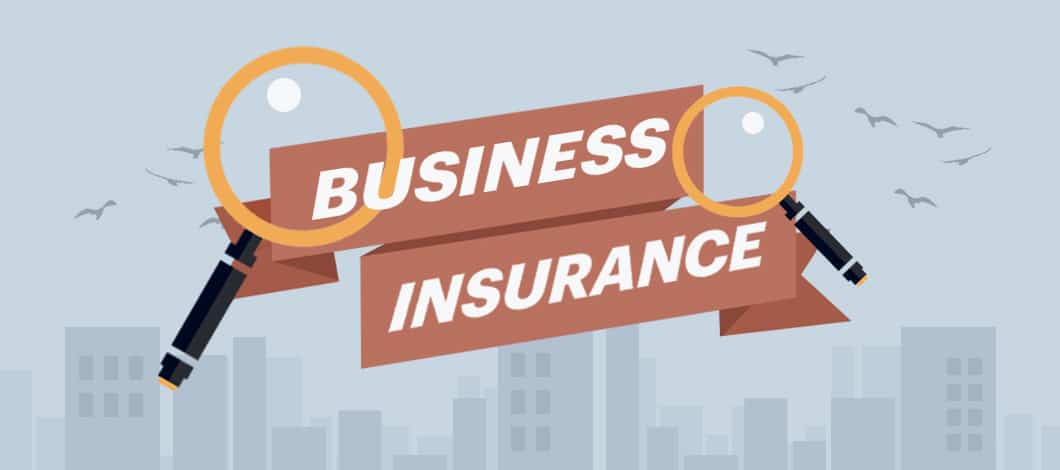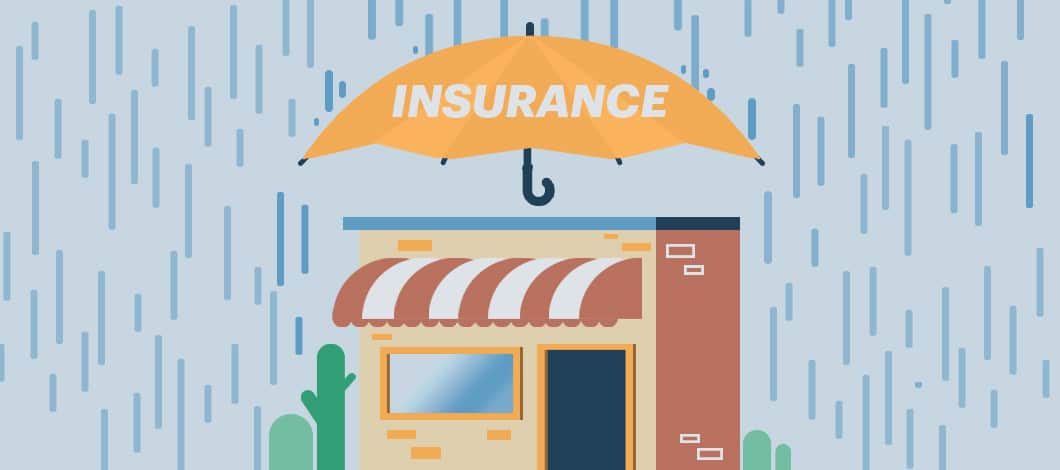Knowing how to compare business quotes for insurance can save you hundreds or thousands of dollars.
Understanding commercial insurance provides you with a basis to compare business insurance policies. You can choose from many different types of commercial insurance policies.
Here’s a brief rundown on what each of these different types of insurance covers.
1. General Liability Insurance
General liability insurance protects you from claims by nonemployees related to certain types of injury or property loss.
Types of claims covered typically include:
- Bodily injury to customers and resulting medical bills
- Property damage, such as damage to customer vehicles parked on your lot
- Damage caused by defective products
- Reputational harm claims
- Advertising injuries, such as trademark infringement claims
- Legal fees, judgments and settlements incurred from lawsuits
General liability insurance doesn’t normally cover:
- Employee injuries, which fall under workers compensation insurance
- Liability stemming from professional errors, which fall under professional liability insurance
- Damage or theft involving commercial property owned by your business, which fall under commercial property insurance
- Damage or theft involving commercial vehicles used by your business, which fall under commercial auto insurance
However, some providers may offer policies that combine general liability insurance with coverage for some of these scenarios. Pay close attention to details when you compare liability insurance policies.
2. Worker Compensation Insurance
Worker compensation insurance protects you against claims by employees involving injuries or illnesses suffered while working for you.
It usually covers:
- Wage loss
- Medical expenses
- Legal expenses
- Support of families who lose a loved one to work-related injury or illness
Each state has its own requirements for carrying worker compensation insurance. If you have employees, you normally need it.
3. Employer Liability Insurance
Employer liability insurance covers certain gaps left by worker compensation insurance. When making a claim under worker compensation insurance, the injured party doesn’t have to prove employer fault or negligence, only the fact of job-related injury or illness.
However, if the injured party claims the employer is liable because of negligence, they can open a separate civil suit for additional compensation instead of settling for a worker compensation claim with your insurance provider. Employer liability insurance protects you in this situation. In some states, you must carry it along with worker compensation insurance.

4. Professional Liability Insurance
Professional liability insurance, also called errors and omissions (E&O) insurance or professional indemnity insurance in certain industries, shields you against claims regarding losses alleged to stem from your professional advice.
For example, an accounting client may file a liability claim against an accountant. In some states, businesses in certain industries must carry professional liability insurance.
5. Product Liability Insurance
Product liability insurance guards you against claims regarding the use of products you make, distribute or sell. It covers financial losses involving:
- Illness or injury
- Property damage
- Legal expenses
It doesn’t cover accidents harming customers, which are covered by general liability insurance, or injuries involving workers, which are covered by worker compensation insurance or employer liability insurance. Product liability insurance also doesn’t cover expenses stemming from product recalls, which fall under a specialized type of insurance known as product recall insurance.
6. Employment Practices Liability Insurance
Employment practices liability insurance shields you when an employee accuses you of illegal practices such as:
- Discrimination
- Harassment
- Retaliation
- Wrongful termination, discipline or demotion
- Failing to provide qualified medical or family leave under the Family and Medical Leave Act
Employment practices liability insurance covers legal fees and settlements associated with these types of claims.
7. Cyber Liability Insurance
Cyber liability insurance protects you against liability stemming from issues with your computer network, such as data loss and data breaches. It typically covers legal fees, settlement costs and regulatory fines.
8. Data Breach Insurance
Data breach insurance protects you from claims involving computer disruptions that don’t necessarily involve allegations of liability.
For example, if your company network is breached, data breach insurance can cover expenses such as lost business, computer forensics and customer credit monitoring. Some policies combine data breach and cyber liability insurance.
9. Commercial Property Insurance
Commercial property insurance protects you from costs associated with damage to buildings or equipment you own or rent resulting from fire, theft or other covered categories. It can help you pay for repairs or replacements.
Some policies may also help replace lost income. Commercial property insurance normally doesn’t cover damage from earthquakes or floods, which require separate policies.
10. Commercial Auto Insurance
Commercial auto insurance covers property damage and bodily injury claims involving company-owned vehicles driven by members of your business.
Personal car insurance policies don’t cover claims involving business-owned vehicles.
11. Business Income Insurance
Business income insurance (also known as business interruption insurance) protects you from income losses stemming from causes such as fire damage, wind damage or theft. You can use it to cover costs such as rent or payroll.
It doesn’t usually cover income interrupted by accident or illness.
12. Commercial Umbrella Insurance
Commercial umbrella policies, also known as business owner’s policies (BOPs), extend the scope of liability insurance policies by increasing their limits or combining them with other types of commercial insurance. For instance, this type of policy might increase the limit of your general liability insurance, or it might combine your general liability policy with a commercial auto policy.
Commercial umbrella insurance usually expands:
- General liability insurance
- Workers compensation insurance
- Employers liability insurance
- Commercial auto insurance
The precise range of umbrella coverage varies by provider and policy.
13. Commercial Package Policy
A commercial package policy (CPP) is a policy that combines a number of policies into a single package. It can include many of the types of insurance described above, along with some others.
It typically doesn’t include worker compensation insurance and certain other types of insurance which are normally purchased separately. The exact coverage will vary based on individual providers and policies.

What to Look for in a Commercial Insurance Quote
Knowing the difference between the different types of policies described above gives you a basis to compare business insurance prices. When you’re comparing quotes, in addition to comparing prices, it’s important to know what type of policy you’re being offered and what it covers, as well as what it doesn’t cover.
You need a policy that provides enough coverage to guard you against the main risks to your business. For example, if you estimate that you risk losing $1 million from a general liability claim, you should look for a general liability policy that provides that much coverage.
When estimating how much coverage you need, it’s prudent to research the potential risk in your specific industry as well as the legal requirements in your geographic location. Every industry is different. Some states may have specific coverage requirements for certain industries. Each state has its own department of insurance or the equivalent which can provide you with information. An experienced insurance agent or broker also can assist you with determining what type of coverage you need and how much you need.
Having a list of questions can help you establish criteria for comparing quotes. Here are some tips on questions to ask when evaluating quotes:
- What type of policy is it?
- What types of losses are covered?
- What types of losses are excluded?
- What are the dollar amounts of your coverage limits?
- How much does your premium cost?
- How much is your deductible?
- Are there any hidden costs in the fine print? (For example, do you have to pay a high deductible before your coverage kicks in?)
- How much will I be able to deduct from my taxes for the costs of this policy?
- Could I increase my savings by bundling policies together?
Be sure to read your policy terms carefully in order to answer these questions accurately. Ask your insurance agent to clarify anything you aren’t sure about.
How to Evaluate Commercial Insurance Agents and Brokers
When it comes to choosing an insurance policy, comparing providers can be just as important as comparing policies. A knowledgeable advisor can help you find the right policy for you.
Professional insurance advisors include:
- Captive agents, who represent a single company and get paid by the company
- Independent agents, who represent multiple companies and get paid commissions by these companies
- Independent brokers, who are familiar with multiple companies but represent the insurance buyer and are paid a commission by the insurance buyer
Because a broker doesn’t have a contract with a particular insurance provider, they may be able to provide you with a broader range of options better suited to your needs. They typically charge a fee of up to 15% of your policy premium.
When choosing a commercial agent or broker, here are some important questions to consider:
- Which insurance carrier or carriers do they represent?
- What types of coverage do they offer?
- Are they licensed to operate in your state?
- How many years of experience do they have?
- Do they have experience with your industry?
- What do online reviews say about them?
- Do they provide quotes efficiently when you ask for them?
- What policy service procedures do they use to handle customer accounts?
- Do they handle claims themselves or do they work with a dedicated claims department?
- What are their procedures for reporting a claim?
- What do they charge?
You can answer these questions by visiting websites or talking to the agent or broker you’re considering. Taking the time to compare advisors can help you find a better quote.
Where to Compare Business Insurance Quotes
If you don’t want to pay a broker, if you want to research quotes yourself before working with a broker or if you need help finding an agent or broker, you can use a number of online resources to compare commercial insurance quotes and find small business insurance providers.
Here are some sites you can use to research insurance quotes:
These sites can provide you with quotes as well as put you in touch with agents. You also can search for commercial insurance brokers in your area by using your location as a search term combined with a phrase such as “commercial insurance broker”.
Compare Business Quotes to Find the Right Policy
Running a business can expose you to the risk of thousands or even millions of dollars in liability. Taking the time to compare business quotes before purchasing commercial insurance can save you significant money and even keep you from going bankrupt.
The best way to find the right policy is to hire a knowledgeable commercial insurance broker. If you plan to hire an insurance broker, be sure to factor their fee into your insurance costs. You can use a business line of credit or another form of small business financing to cover the costs of brokers and insurance policies.










